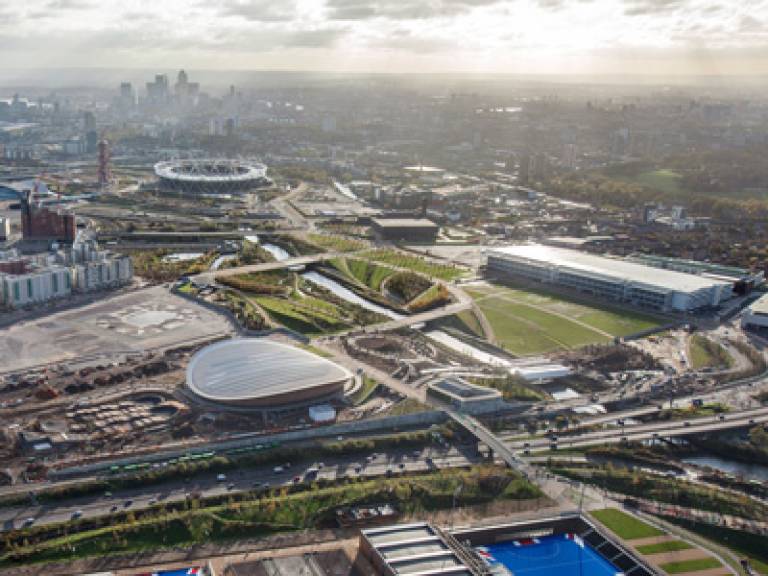UCL has announced a second campus - UCL East - on Queen Elizabeth Olympic Park
2 December 2014
UCL is to build a new second campus on Queen Elizabeth Olympic Park, to form part of a wider Education and Cultural Quarter following the government's announcement of £152m in support of the project.

UCL East, expected to open in 2018, is envisaged as a radical new model of how a university campus can be embedded in the local community and with businesses, as well as providing world-leading research, education,entrepreneurship and innovation.
It is anticipated that the new UCL East site south of the ArcelorMittal Orbit will cover 11 acres and provide up to 125,000m2 of space, with the first major construction phase of the development establishing an operational presence on the Park by autumn 2018.With the project now confirmed, UCL will be seeking to develop some immediate initiatives that can be developed ahead of the main building project, building on community engagement initiatives that have been taking place over the last year, including summer schools, activities by the Grant Museum of Zoology for families, a mentoring scheme and taster days to encourage young people across Newham to consider going to university.
UCL East represents the largest ever single expansion of UCL since the university was founded nearly 200 years ago.
The first phase of the UCL East site - totalling 50,000 m2 - will bring together expertise across disciplines, with the aim of forging new connections between researchers and business; fostering radical innovation, new insights and new industries.
They will include:
- The UCL Generator which will build on UCL's existing world-class activities in design to open the university's first School of Design. The School will offer a new taught courses in Design alongside research and innovation opportunities.
The Generator will also include a UCL Museum of the Future- a reinvention of the university museum for the 21st century. An indoor and outdoor experience, the Museum will use immersive exhibition galleries, collections libraries, studio and performance spaces to engage visitors.
- The UCL Centre for Experimental Engineering, which will be established to address the acute skills shortage in engineering.
As part of this, a new UCL Centre for Engineering Education will be established to develop new approaches to experiential learning in engineering, alongside prototyping and manufacturing facilities, which will be housed in the new UCL Make Space East.
There will be cutting-edge large-scale fabrication and prototype development facilities which - as well as being available to research staff and students - will be made available for industry collaboration to help boost growth.
UCL will also seek partners to develop a new engineering apprenticeship scheme for local young people, to equip them with the skills to become the next generation of engineers.
- UCL Innovation - A new centre will focus on technology - with a series of incubators integrating research activities and technology development alongside businesses of a variety of sizes, it will focus on innovating and commercializing in three thematic areas, including but not restricted to:
Biological devices labs - the first of their kind in the UK - focusing on creating implantable devices;
a facility that will focus on creating and fabricating wearable sensors technology that can monitor health in real-time;
a facility that will focus on researching and creating technology and environments - including urban areas - that facilitate and promote wellbeing.
- UCL Living will comprise living space for undergraduates, postgraduate research students, as well as early career academic staff, with the aim of providing a way of innovating new ways of living in 21st century economies.
Subsequent phases of the development will be capable of delivering around 75,000m2 of additional space.
Professor Stephen Caddick, Vice-Provost (Enterprise & London) at UCL said:
"UCL East represents the largest ever single expansion of UCL since the university was founded nearly 200 years ago. "Our new site will be a beacon of how universities should work in decades to come - outward looking, connected to the local community and providing facilities to businesses to work on site to bring new discoveries and inventions out of the lab and into the marketplace.
"Our plans are designed to make a real and practical difference to the lives of people in Newham and London more widely, as well as making a genuine contribution to growth and jobs.
"London can be the global capital for higher education and we see this development - alongside many others in London - as being an important step in that direction."
 Close
Close

